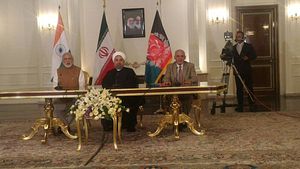Indian Prime Minister Narendra Modi’s recent visit to Iran accomplished a lot, at least on paper. Of greatest importance to India is the conclusion of a trilateral agreement with Afghanistan and Iran for the development of the Chabahar Port. The port, into which India is investing $500 million, is located in Iran’s Sistan-e-Baluchestan province and would give New Delhi direct connectivity with Afghanistan. This is necessary in order to bypass Pakistan, which has so far denied access to its roads to India for trading with Afghanistan and Central Asia.
While the Chabahar deal certainly benefits India, Iran, and Afghanistan and strengthens relations between those countries, I am skeptical that it will be a big regional game changer anytime soon, no matter how much the relevant parties want it to be. The following are the main reasons this would be the case:
-
The Indian role in Chabahar could diminish. Although the deal was first floated over ten years ago, it was only finalized this May. In the meantime, China has moved much faster to establish itself in neighboring Gwadar in Pakistan. Iran is quickly looking to reintegrate itself into the global economy and can only wait so long for India to deliver. India could find itself losing out to China in Chabahar. Iran has left the door open to Chinese and Pakistani involvement there. While Iran understands and respects India’s concerns, its chief stake in Chabahar is economic.
-
While Indian lorries cannot go overland to Afghanistan through Pakistan, a limited amount of Afghan trucking can pass through Pakistan to get to India or can use Pakistani ports to access the greater world. This lopsided situation means that Afghanistan can hardly redirect all its trade away from going through Pakistan in order to use Chabahar instead. This reduces the amount of pressure that Indian investment in Chabahar can exert on Pakistan.
-
Pakistan will do its utmost to undermine the project once it links to Afghanistan’s road network. Attacks on Indian trade by Taliban factions friendly with Pakistan are likely.
For there to truly be transportation connectivity in South Asia and between South and Central Asia, Pakistan must reverse its strategy and see the benefits of trade involving India, rather than looking for every possible way to hurt India. By allowing India and Afghanistan and Central Asian countries to trade through its territory, Pakistan would greatly increase the volume of trade that would otherwise be limited to a port in Iran. It would save every party fuel and associated costs that would otherwise be spent on a convoluted journey. Kabul and Delhi have been connected via roads since the Mughal era and the distance between India and Afghanistan is barely 300 miles at some points. Moreover, Pakistan itself would be a major beneficiary from this trade, especially through charging tolls and fees for access to transportation facilities along the way.
It is therefore a major loss for the entire region that Pakistan won’t allow India access to its roads. A route going through Iran into Afghanistan is only a partial solution to the problem of connectivity in South and Central Asia; a more permanent solution would require a greater shift in Pakistan’s attitude toward trade and its development of an ability to separate strategic and economic issues. More than any other multilateral issue in South Asia, this is what matters. It is important for every South and Central Asian leader to go out of their way to convince Pakistan to integrate its transportation links into those of the greater region.
India itself should pursue this goal as well, since greater access to Afghanistan also depends on connectivity through Pakistan. Although India claims a 106 kilometer border with Afghanistan through its claim of the entirety of the disputed region of Kashmir, it is unlikely it would gain this region from Pakistan in the event of a final settlement. Therefore, its only direct overland path to Afghanistan would be through Pakistan for the foreseeable future.

































